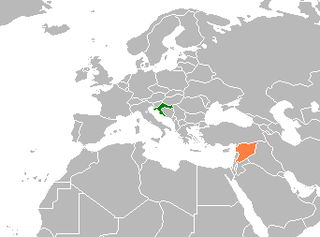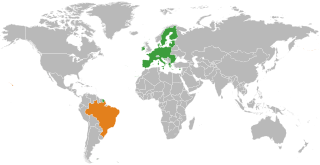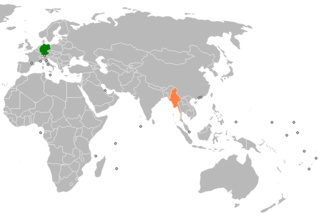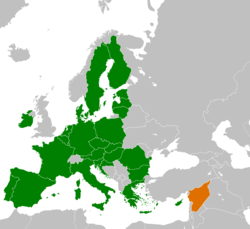A European Union Association Agreement or simply Association Agreement (AA) is a treaty between the European Union (EU), its Member States and a non-EU country that creates a framework for co-operation between them. Areas frequently covered by such agreements include the development of political, trade, social, cultural and security links.

Relations between the European Union (EU) and the People's Republic of China (PRC) or Sino–European relations are bilateral relations that were established in 1975 between the PRC and the European Community. The EU is the PRC's largest trading partner, and the PRC is the EU's largest trade partner.

Although there has been a large degree of integration between European Union member states, foreign relations is still a largely intergovernmental matter, with the 27 states controlling their own relations to a large degree. However, with the Union holding more weight as a single entity, there are at times attempts to speak with one voice, notably on trade and energy matters. The High Representative of the Union for Foreign Affairs and Security Policy personifies this role.

Israel is an associated state of the European Union. The relations between the two are framed in the European Neighbourhood Policy (ENP), the Euro-Mediterranean Partnership, and the Union for the Mediterranean.

The Republic of Azerbaijan and the European Union (EU) have maintained a positive relationship through the years and have become more closely linked since 1991. Azerbaijan is currently part of the European Neighborhood Policy, the Eastern Partnership and the Council of Europe. The EU is the largest foreign grant donor to and investor in Azerbaijan, both in the government sector and civil society, making available over 600 million EURO of bilateral EU assistance since 1992.

The Kingdom of Spain and the Republic of Turkey maintain diplomatic relations. Spain has an embassy in Ankara and a consulate general in Istanbul. Turkey has an embassy in Madrid and a consulate general in Barcelona.

Croatia–Syria relations are bilateral relations between Croatia and the Syrian Arab Republic. Both countries established diplomatic relations on 29 August 1997. Croatia is represented in Syria through its embassy in Cairo in Egypt and an honorary consulate in Damascus. Syria is represented in Croatia through its embassy in Budapest, Hungary and an honorary consulate in Zagreb. Both countries are full members of the Union for the Mediterranean, although Syria suspended its membership in 2011.

Belgian–Turkish relations are foreign relations between Belgium and Turkey. Belgium has an embassy in Ankara, a consulate–general in Istanbul and two consulates in Antalya and İzmir. Turkey has an embassy in Brussels and a consulate–general in Antwerp.

Brazil and the European Union established diplomatic relations in 1960. The European Union and Brazil have close historical, cultural, economic and political ties. At the 1st EU-Brazil summit, in 2007, Brazil entered in a strategic partnership with the European Union, strengthening their ties. This new relationship places Brazil high on the EU's political map.

European Union–Kazakhstan relations are the international relations between the Republic of Kazakhstan and the common foreign policy and trade relations of the European Union.

European Union–Iran relations are the bilateral relations between Iran and the European Union (EU). The EU is Iran's largest trading partner, along with China and the United Arab Emirates. Trade with Iran is subject to the general EU import regime and the EU supports the goal of Iranian accession to the World Trade Organization (WTO). The EU has accused and criticized Iran for human rights violations, which led to diplomatic tensions, but both sides aim at improving and normalizing relations. Should Turkey's accession to the EU take place, Iran will border the European Union.

Lebanon–European Union relations see substantial ties through the EU's European Neighborhood Policy (ENP). The EU is the largest trading partner of Lebanon.

Cuba–European Union relations are the international relations between the Republic of Cuba and the common foreign policy and trade relations of the European Union (EU). Relations have been strained in recent years, due to Cuba's poor human rights record and the European Union's numerous accusations of Cuba's human rights abuses.

Relations between the European Union (EU) and Japan date back to 1959. They have a strong trade relationship, particularly in investment flows.

Malaysia–European Union relations are the multilateral relations between Malaysia and the European Union. Malaysia has had a free trade agreement with the European Union (EU) since 2010.

Argentina has strong cultural and historical links to the European Union (EU) and the EU is Argentina's biggest investor.

Bahrain–European Union relations are the international relations between the Kingdom of Bahrain in the Persian Gulf and the European Union (EU).

Italy–Syria relations refer to bilateral relations between Italy and Syria. The Syrian embassy in Italy was located in Rome, whereas the consulate located in Milan. On 26 July 2024, Rome made the decision to start a reaprochement with Syria and open its embassy in Damascus.

In 2014, the Federal Republic of Germany and the Republic of the Union of Myanmar celebrated the 60th anniversary of Germany–Myanmar relations.



















